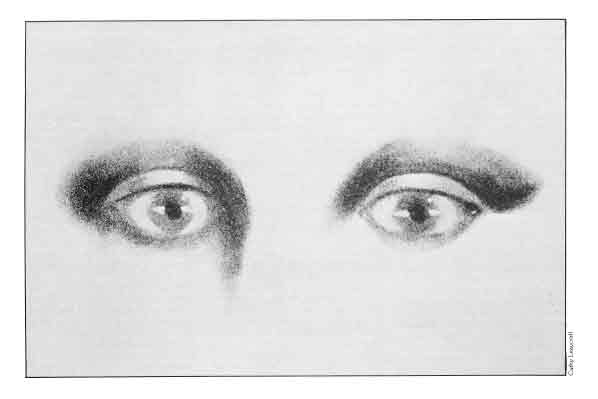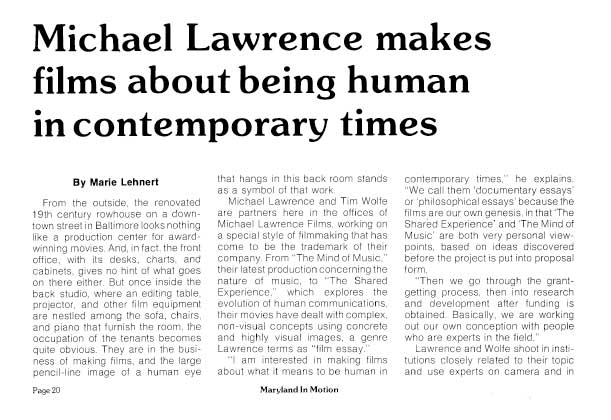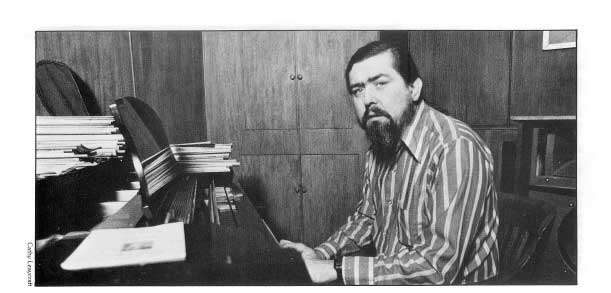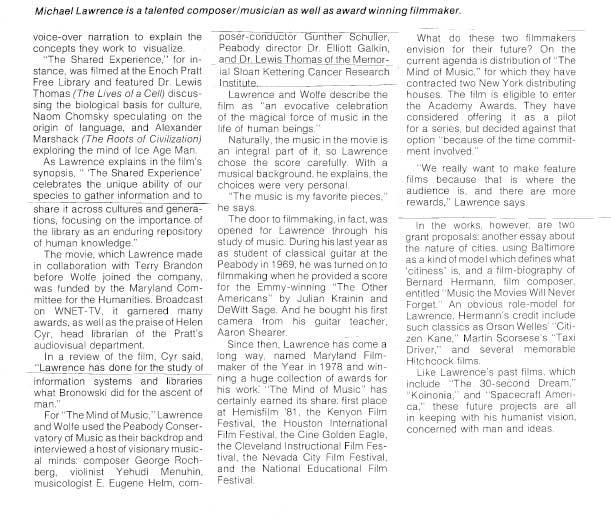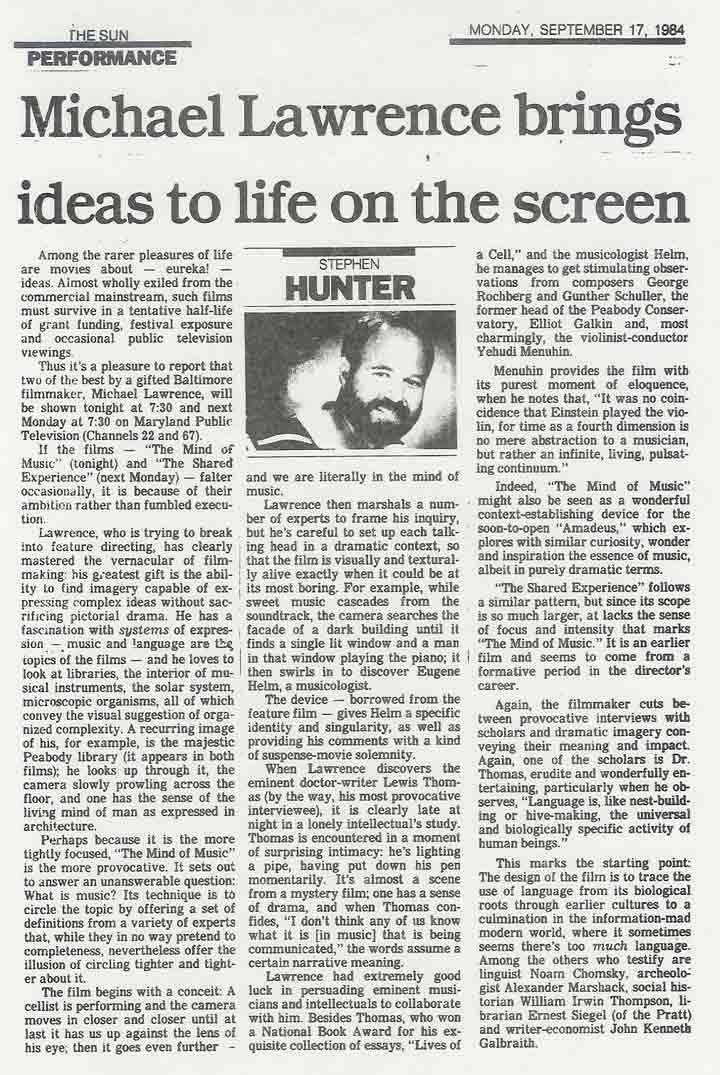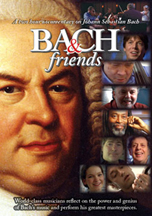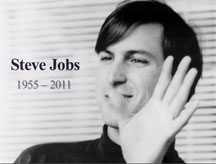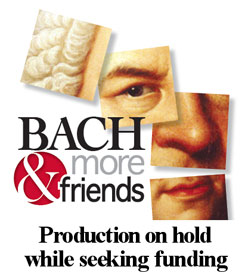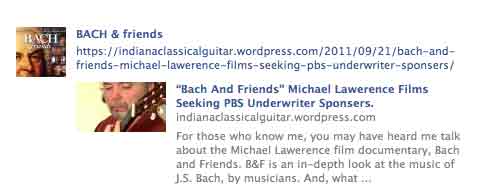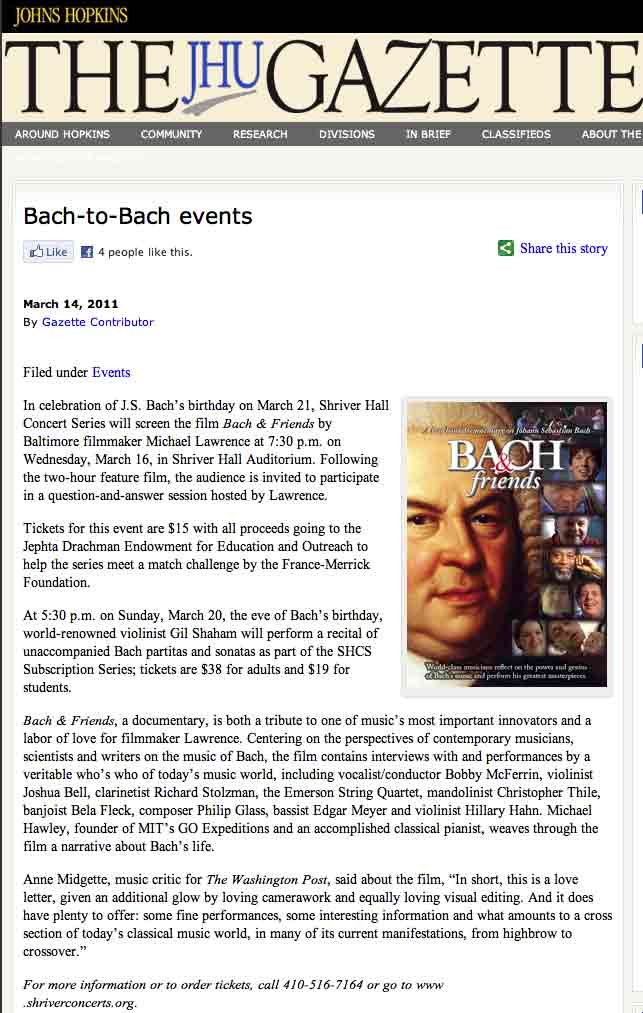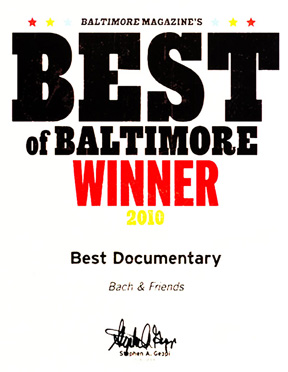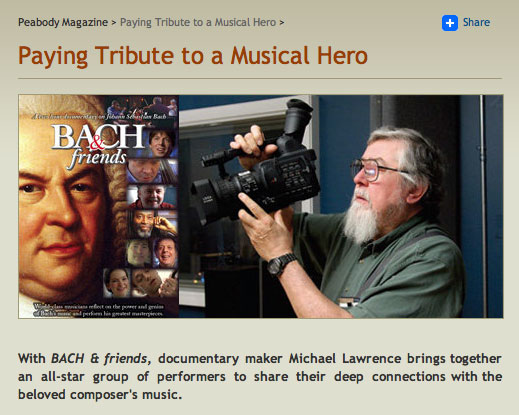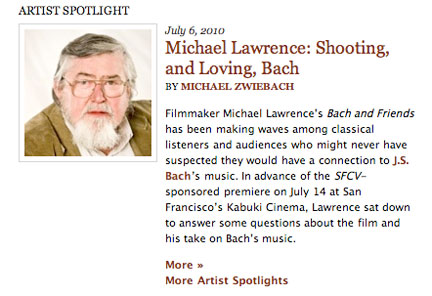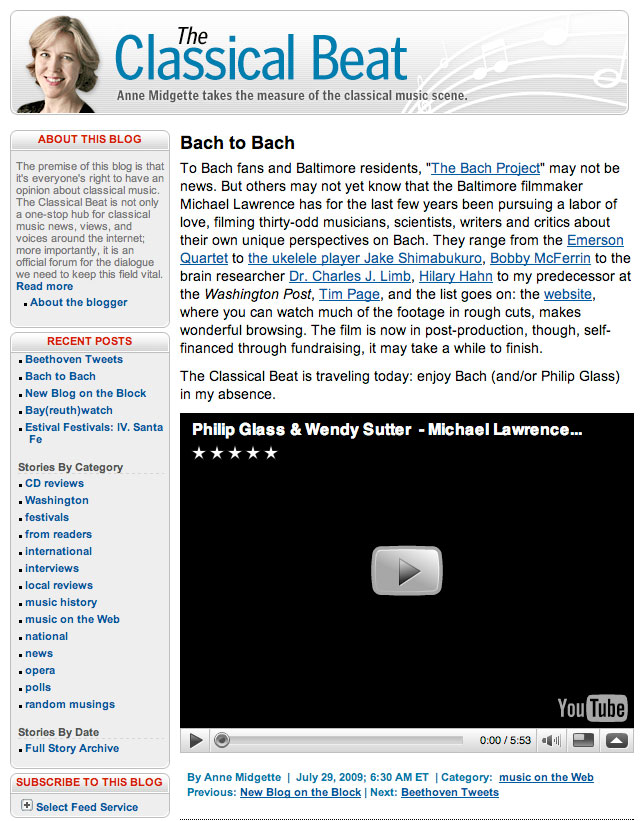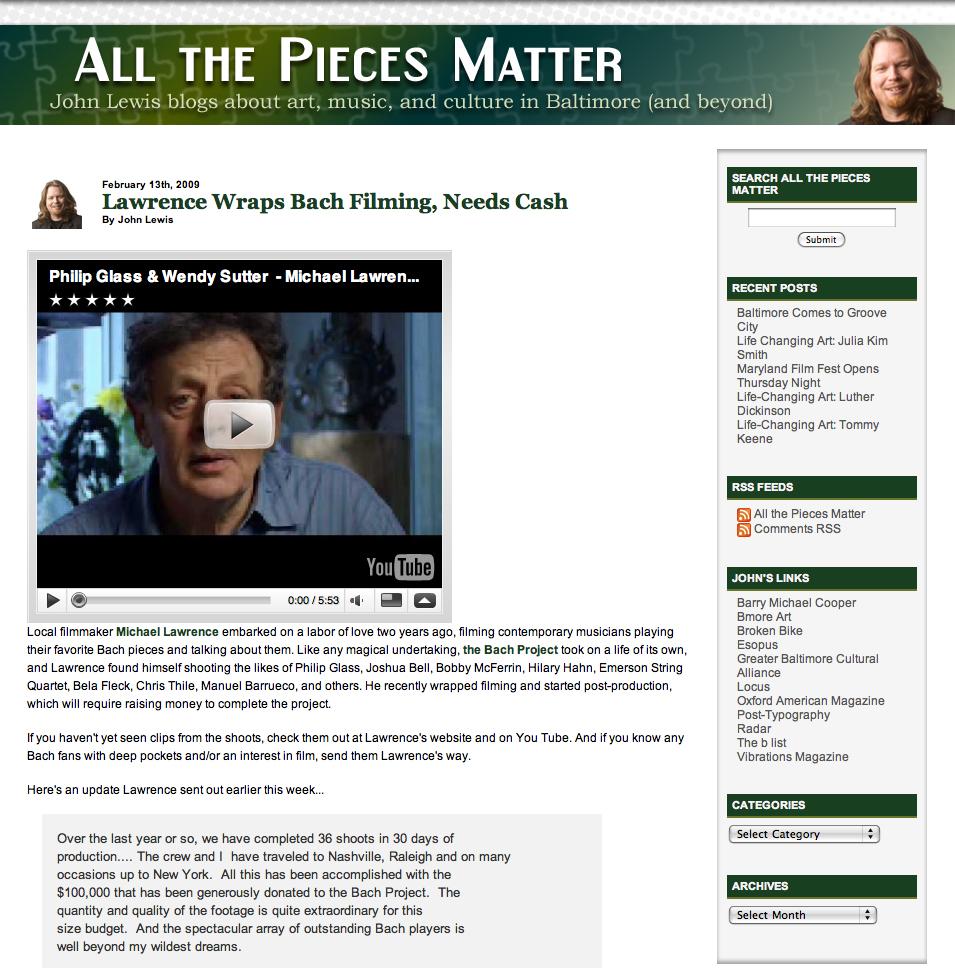News
Michael Lawrence Films
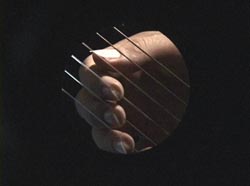
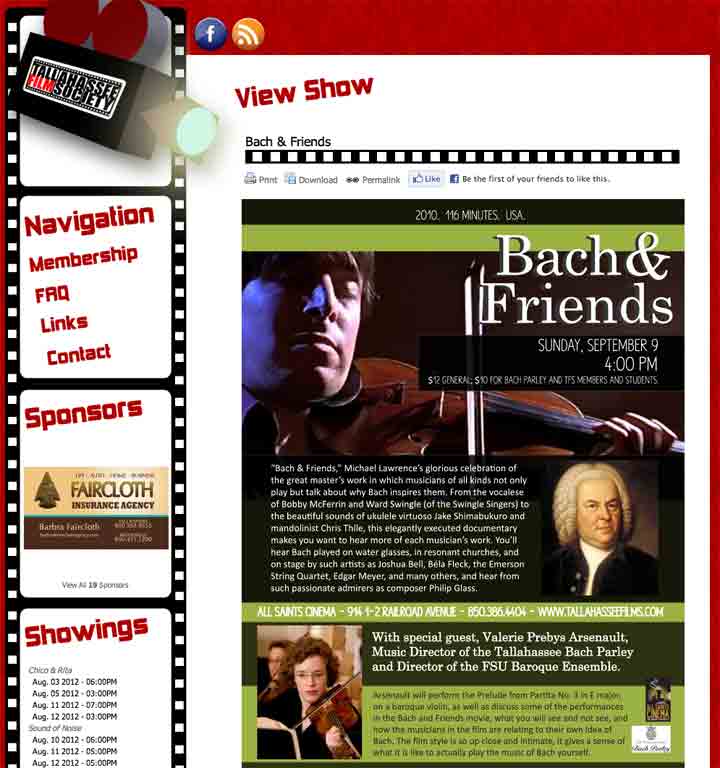
Serge Cuca, South African violinist
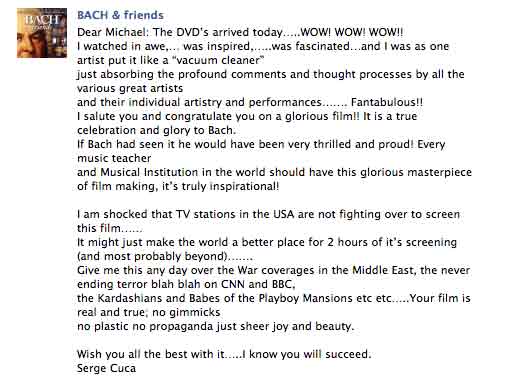
Documentary Michael Lawrence’s Bach & Friends is no Bach bio.
Rather, it’s an extended meditation on the composer’s ongoing relevance
and widespread influence. Lawrence, a local filmmaker whose credits
include a documentary on guitarist Manual Barrueco, filmed a "who’s who"
of contemporary musicians—including Philip Glass, Simone Dinnerstein,
Joshua Bell, Bobby McFerrin, Béla Fleck, Hilary Hahn, and Barrueco—riffing
about Bach’s significance and backing up their statements with jaw-dropping
performances. A few talking heads add some critical perspective, but Lawrence
pretty much lets the music do the talking. The DVD includes a bonus disc of
unedited performances, and they help reinforce Lawrence’s premise that Bach rocks.
John Lewis. Baltimore Magazine
Baltimore Magazine's 2010 Best of Baltimore listing recognized
Peabody alumni Mike Lawrence (BM ’70, Guitar), for Best Documentary
(BACH & friends, which features appearances by several Peabody faculty
members and alumni). The Baltimore premiere of BACH & friends will take place
at the Charles Theatre, 1711 N. Charles Street, at the Oct. 3 Cinema Sunday.
Mike's Cine Maryland Interview
Mike's BBC Radio Interview on BACH & friends
Mike's WEAA Radio Interview with Marc Steiner
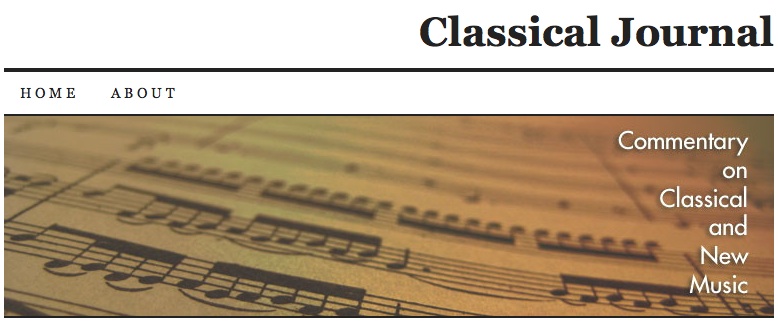
If you are a fan of J.S. Bach, as I am, and haven’t heard about The Bach Project, you owe it to yourself to keep reading.
For several years, Baltimore filmmaker Michael Lawrence has been working on a documentary film centered on the perspectives of contemporary musicians, scientists, and writers on the music of Bach and its place in their musical lives. The film, now titled Bach and Friends, is scheduled for a DVD release in January. The film contains interviews and performances from a veritable Who’s Who of today’s music world: Bobby McFerrin, violinist Joshua Bell, clarinetist Richard Stoltzman, the Emerson String Quartet, mandolinist Chris Thile, Béla Fleck, Philip Glass and Wendy Sutter, Peter Schickele, bassist Edgar Meyer, violinist Hillary Hahn, music critic Tim Page … and many more.
The Bach Project was originally launched at the EG’07 (Entertainment Gathering) and Bach and Friends returns to the January 2010 event to celebrate its completion. That EG will be held in Monterey, January 21-23, 2010.
My own excitement is building for the January release of the DVD of the documentary. Lawrence has indicated that the set will include a second “Bonus DVD” with music-only, complete performances which will run about an hour and a half.
Numerous video clips from the film have been posted on YouTube. The latest is violinist Hillary Hahn speaking about Bach and performing the Grave from the Violin Sonata No. 2, BWV 1003. Click here to view this clip. All of the clips are really intriguing, but check out Chris Thile, Edgar Meyer, or Philip Glass/Wendy Sutter.
When the Bach and Friends DVD actually releases in January, I’ll post information here on how to obtain it.
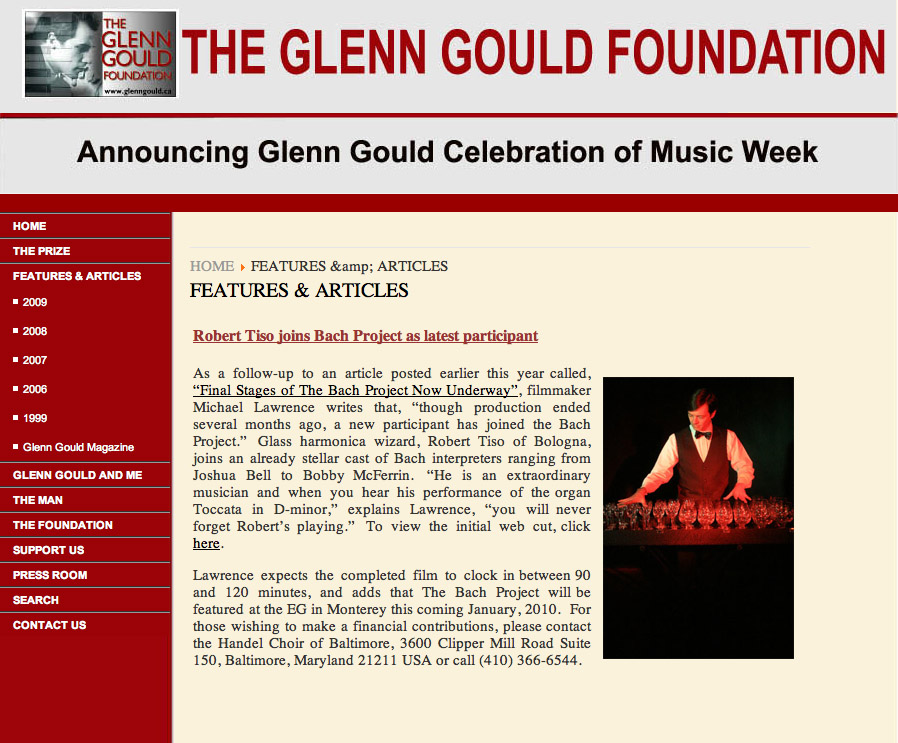
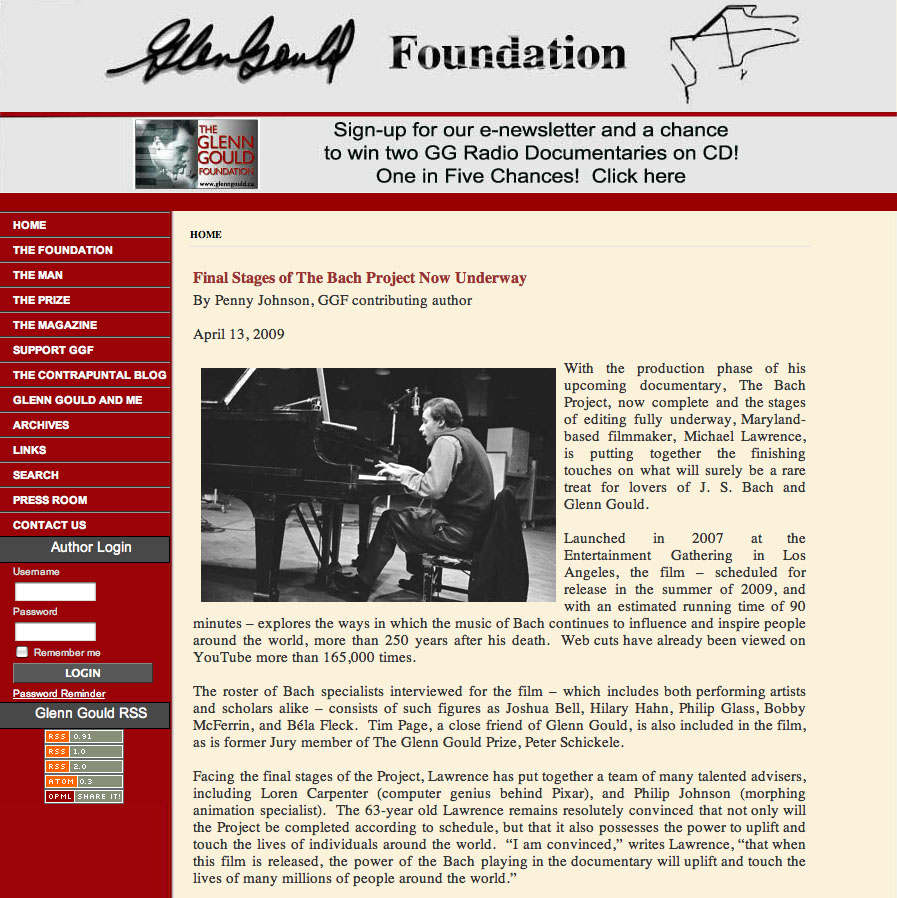
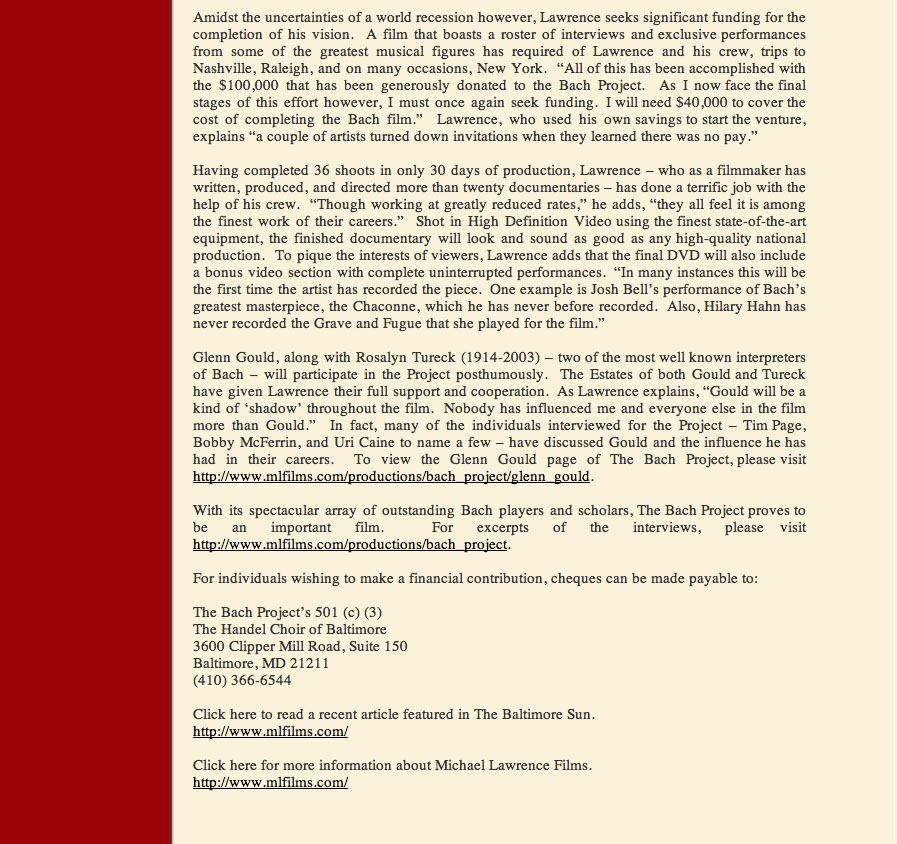
The Bach Project Glenn Gould Web Page
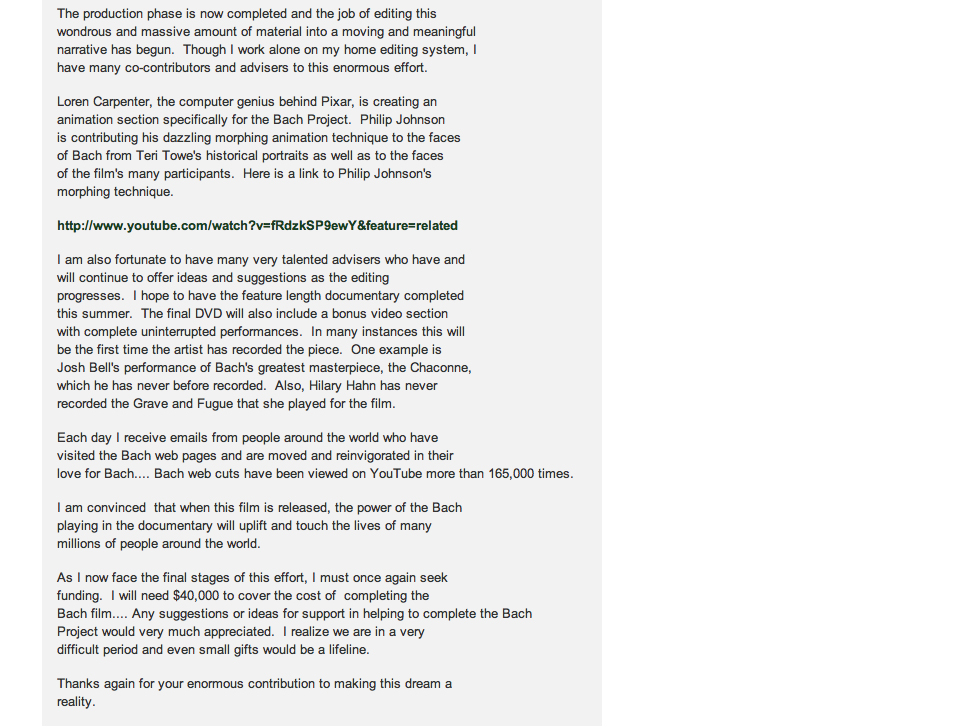
The Baltimore Sun
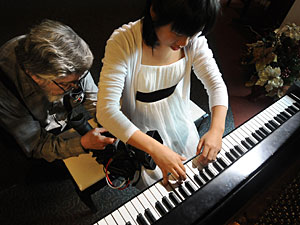
Why we love Bach
A Baltimore filmmaker recruits everyone from Joshua Bell to Bela Fleck
for a documentary about the composer's enduring appeal
By Tim Smith | tim [dot] smith [at] baltsun [dot] com
December 21, 2008
Crawling along the floor in front of a Steinway grand, Michael Lawrence aims his camera at two hands busily moving across the keys to articulate complex baroque counterpoint.
The resulting close-up isn't just about the actual pianist doing the playing. It says something, too, maybe even more, about the Baltimore filmmaker. Lawrence is trying to zoom in on nothing less than the enduring, inspiring genius of Johann Sebastian Bach.
The film, known as the Bach Project until an official name is chosen, had its final shoot on Friday in New York with celebrated composer Philip Glass. He joins a remarkable range of other Bach lovers interviewed for the film, from stellar violinists Joshua Bell and Hilary Hahn to banjo virtuoso Bela Fleck, from brilliant video game designer Sid Meier to ukulele wizard Jake Shimabukuro.
A couple of weeks ago, Lawrence and his crew filmed 12-year-old pianist Hilda Huang, who flew in from San Francisco to do the shoot at an unusual location, Keswick Multi-Care. Huang, whose affinity for Bach has earned high marks, played selections from the composer's Art of the Fugue and other pieces for an audience of seniors.
That footage may be the film's opening sequence. "It was great seeing someone so young playing Bach for the old people," says the tall, stocky Lawrence, whose long gray hair and beard give him a Santa-esque look at this time of year, complete with friendly eyes. "I'm thinking of having shots of the Keswick residents lead into a faces-of-humanity montage. I might have a title for the film now: The Faces of Bach."
That a film about Bach should end up shooting in a senior care center says something about the breadth of the enterprise. The idea came from Richard Chisolm, Lawrence's director of photography, whose many credits include the ABC series Hopkins 24/7. "His mom died at the center, and he visited her there often," Lawrence says. "He had the idea that the place would be great for the shoot, and it was."
Currently in post-production, the film will explore the different ways that a German composer who died more than 250 years ago continues to inspire musicians and non-musicians alike. An all-music bonus DVD containing complete versions of performances interwoven through interviews in the main film will be included in the final product, which should be on the market this summer.
"Right now, I'm working on finding a structure for the film," says Lawrence, who talks at the equivalent of 70 mph, interrupted by the occasional hearty chuckle. "I've got to take chances. I don't want to just string these [interviews] together. There has to be a story. It is not easy, but I've got the goods."
Those goods, preserved on state-of-the-digital-art equipment in Lawrence's meticulously organized second-floor office/studio at his home, include a sequence with Bell discussing and playing Bach's formidable, profound Chaconne, which he has never recorded. "Bach is a hero of mine, and of every other living and dead musician," Bell says from New York. "This was a nice opportunity to delve deeper into the Chaconne, and to have a snapshot of this point in my life."
He found Lawrence to be "an easygoing, jolly guy. And he has a genuine love for Bach. I'm assuming his affection will come through in the film," Bell says.
His involvement with the project didn't stop when the cameras did. He also represented the project with Lawrence in California this month at the 2008 Entertainment Gathering, an annual event that attracts a heady assortment of creative people. The roster included screenwriter Marshall Brickman, nature photographer Franz Lanting and singer/songwriter Todd Rundgren.
It was at the 2007 EG that Lawrence gave an initial presentation about his project, garnering some funding (he used his own savings to start the venture). He gave an update at this year's EG, and then introduced Bell, who played the Chaconne for the attendees.
The Indianapolis-born Lawrence, 63, traces his own fascination with Bach to his student days. "I think it was the Swingle Singers that really hooked me," he says. This a cappella jazz vocal ensemble, directed by Ward Swingle, made a splash singing ingenious versions of Bach pieces in the 1960s (they can be heard briefly on the soundtrack of the new film Milk).
Swingle flew from Paris earlier this year specifically for Lawrence's project. On film, he discusses his group's novelty - "People hadn't scatted Bach before" - and the versatility of Bach's music. "You can appreciate [it] in so many ways," he says. "It's mind-boggling." Swingle describes how he starts each morning performing something by Bach: "It lifts you up for the day, and you lead a better life as a result."
When Lawrence arrived at Peabody in the 1960s, Lawrence was getting most of his musical lifts from playing folk music and bluegrass on guitar and banjo. He was accepted into the classical guitar program created by noted pedagogue Aaron Shearer, but Lawrence could barely read music. "Aaron would play some Bach," Lawrence recalls, "and I would say, 'That song sounds cool.' 'Hey, Mike, songs have words; that's a piece.' I really didn't know much."
Lawrence went on to graduate with the first guitar class at Peabody, then gravitated toward film, first as composer for an Emmy-winning documentary by Julian Krainin, The Other Americans, and later as a collaborative filmmaker with Krainin on a dozen documentaries. These include The Quiz Show Scandal, which inspired a film by Robert Redford.
The guitar-training experience at Peabody wasn't forgotten. Once Lawrence started making his own films, he did one on his former teacher, Aaron Shearer: A Life With the Guitar. Other projects include The Mind of Music, featuring revered violinist Yehudi Menuhin, and documentaries on classical guitarist Manuel Barrueco and the Library of Congress.
Until moving to Dundalk in 2002 to the childhood home of his wife, Johanna, Lawrence worked out of a studio in Baltimore where the likes of John Waters and Barry Levinson viewed rushes of their own films. Then came digital technology, "and all of a sudden my 33mm projector and editing equipment were meaningless," Lawrence says. He sold them on eBay.
"My wife basically supports me," Lawrence says. "I keep the bookkeeping straight," says Johanna Lawrence, assistant to the director of performing arts on the Essex campus of Community College of Baltimore County.
"People either love or hate Michael's films, for some reason," she adds. "I think it's because he leaves it to the viewer to interpret."
It's impossible to predict how viewers will interpret the fully edited Bach documentary (expected to be about 90 minutes long), but there certainly is some intriguing material for the filmmaker to work with. After spending a couple of afternoons discussing the film last week in California with his friend and former collaborator Krainin, Lawrence is closer to envisioning the finished product.
"It will take a look at Bach from three vantage points," he says. "There's the emotional, spiritual side. Why is this guy so profound? We won't get any answers, but the question will lead us on a journey. There's the intellectual side - numbers, structures, fugues, fractals. And then the side that has more to do with the physical world of instruments and performance."
The most unexpected instrument in the film is the ukulele. Jake Shimabukuro is seen playing one of Bach's Two-Part Inventions outdoors, as birds provide a subtle counterpoint. "Bach has so many of these cool melodic lines," Shimabukuro says.
Edgar Meyer, the celebrated bassist who traverses bluegrass, jazz and classical with equal commitment, performs a cello transcription. "It's fun trying to make it happen on a bass," he says. "My father [played] Bach's music ... on Sunday mornings before we'd go to church. He used to say, 'That's what it's all about.' Being involved with Bach's music gives me as much pleasure as anything I can think of."
That's a recurring motif of the film footage. Cellist Zuill Bailey, for example, shot in Baltimore's elegant Basilica of the Assumption, says that playing Bach transports him "to a place of wonderment."
There are upbeat moments - Bobby McFerrin vividly sings florid Bach lines and asks: "How can you not dance to that?" - and moments of pathos. Brazilian pianist Joao Carlos Martins, whose two hands were severely damaged, manages to articulate a Bach prelude using little more than his thumbs. "This was the inspiration of Bach in my life. He kept me alive," Martins says, his voice breaking.
Among the offbeat shoots is one of Dr. Charles Limb at the Johns Hopkins University School of Medicine conducting a brain scan of pianist John Bayless improvising on a tiny keyboard to show the mental process that Bach, a famed improviser, experienced.
As he considers how to piece all of these components together, Lawrence maintains the same enthusiasm for the project he had when it started, an enthusiasm that helps explain how he got so many noted people to be in the film. "A couple of artists turned down invitations when they learned there was no pay," he says. At least one reconsidered after learning who else had agreed to participate gratis.
Funding is a constant issue; the project has cost $100,000 so far. Lawrence has had some success attracting money from individuals and foundations (the Handel Choir of Baltimore is the film's nonprofit sponsor), but he is always on the lookout for more support - financial or moral. The same day he heard that Sen. Jay Rockefeller, a West Virginia Democrat, was a major Bach advocate, the filmmaker contacted the congressman's office.
"This project started with only one thing - a love for Bach," Lawrence says. "Every shoot is better than the last one. I've been very lucky. But I could very well fall on my face."
Whatever happens with the film, Lawrence's Bach fever won't likely subside. "For a whole year, I've played Bach on the piano every night for an hour," he says. To demonstrate one cool December evening, he sits at the Yamaha upright in his home and starts on the aria that begins the Goldberg Variations.
Two measures in he stops, not because it's too difficult, but simply too awesome. "Isn't it unbelievable," he says, "that someone could write that?"
Michael Lawrence
Occupation: filmmaker
Born: Indianapolis
Age: 63
Living in: Dundalk, with his wife, Johanna
How he spent one summer as a teenager: Banjo player in The Stephen Foster Story in Bardstown, Ky.
Education: Peabody Conservatory, where he studied guitar
How he spent the '60s: Living with his wife on the organic Koinonia commune in Baltimore County
Copyright © 2008, The Baltimore Sun
DECEMBER 22, 2008
Bach film wraps up shooting
Last Friday, Mike Lawrence, the Baltimore filmmaker putting together an unusual documentary with a wide assortment of musicians and non-musicians talking about the lasting power of Bach, finished the last of the scheduled shoots. He and his crew headed to New York City to interview Philip Glass, the composer most closely associated with minimalism. "Philip talked about the great one better than anyone in the film," Lawrence told me in an email over the weekend.
That reminded me of way back when Glass and fellow minimalists were first stirring up the musical world a few decades ago, and how some listeners seemed to think that the genre had no relationship to the sanctified past, no legitimate roots in the classical tradition. But the first time I heard the Opening of Glass' piano score Glassworks, I remember thinking of the famous C major Prelude that opens Bach's Well-Tempered Clavier Book I -- a piece with minimal melodic activity, just a sequence of chords propelled by a reiterative rhythmic pattern.
It seemed crazy to me the way the anti-minimalist crowd would complain that there was nothing remotely meaningful going on in music of this style. They just weren't really listening. One of the reasons I love this stuff is that it does have a connection to the past, all the while charting its own distinctive path. (See below for a comparison of Bach's C major Prelude and the Opening of Glassworks.) Anyway, it will be interesting to hear what Glass has to say about Bach in the DVD, which should be on the market next summer.
Bach's C major Prelude from Book I of Well-Tempered Clavier:
Opening of Glassworks by Philip Glass:
Posted by Tim Smith at 12:10 PM


Best of Baltimore 2008
Our annual guide to the best Charm City has to offer.
Edited By Max Weiss
ARTS
Work in Progress When local filmmaker Michael Lawrence set out to film various musicians playing and discussing Bach, he had no idea how much cooperation he'd get. As it turns out, a stunning assortment of players have been filmed for Lawrence's upcoming Bach Project including violinists Hilary Hahn and Joshua Bell, singer Bobby McFerrin, the Emerson String Quartet, banjoist Bela Fleck, and mandolin player Chris Thile. Their involvement virtually guarantees a revealing examination of Bach's music.

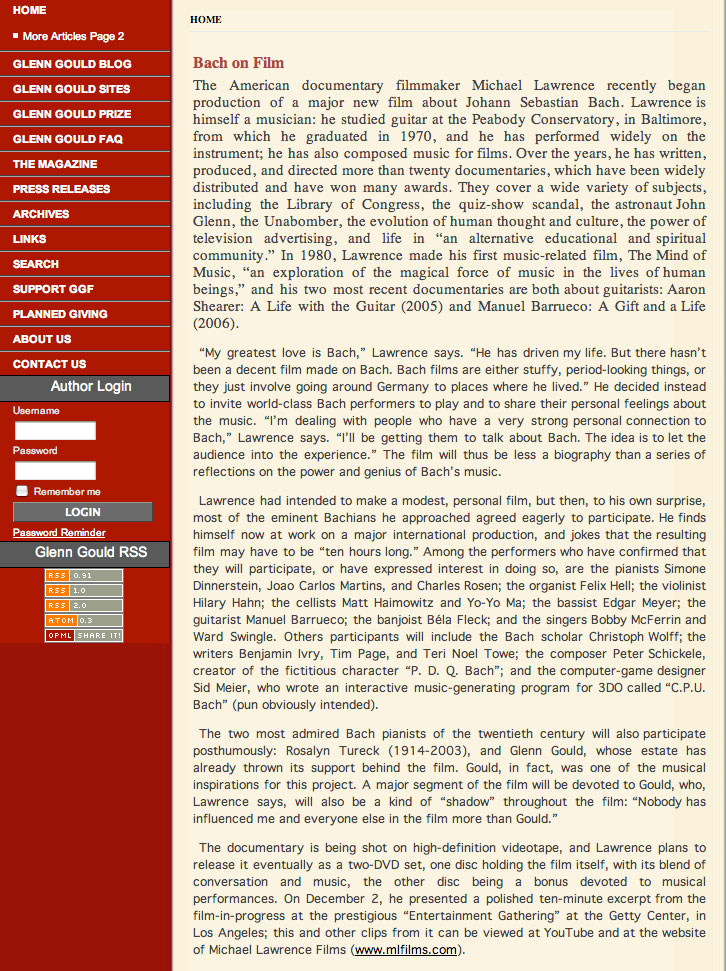
- Kevin Bazzana is the author of "Wondrous Strange: The Life and Art of Glenn Gould"
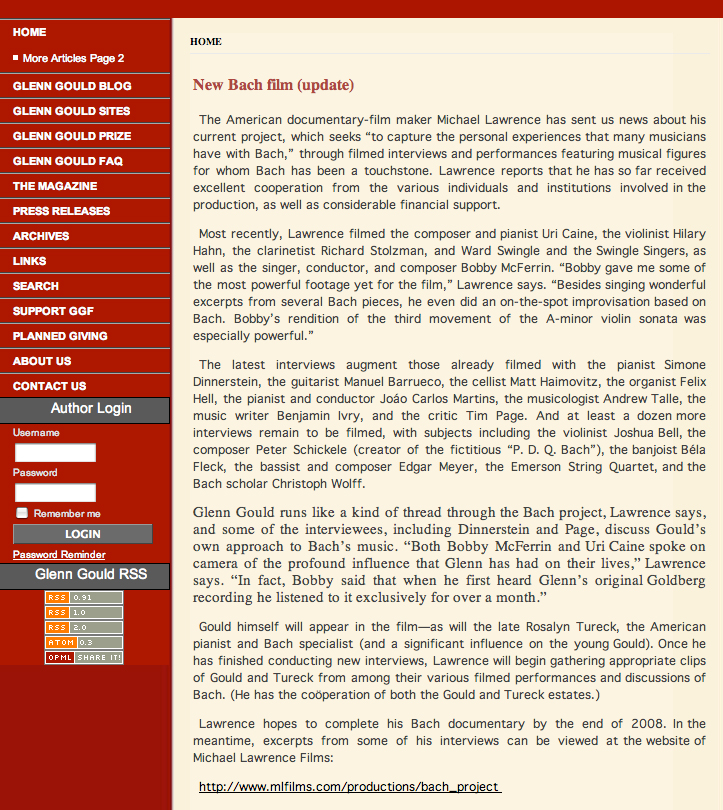
- Michael Lawrence's 'Bach Project' on track
Critical Mass
Critical Mass is written by the Sun's critics for TV, music, movies, art, theater, media and more.
Michael Lawrence's 'Bach Project' on track
The Bach Project, an ambitious attempt by Baltimore filmmaker Michael Lawrence to get to the heart of Bach through musicians who are drawn to his work, is moving along. Lawrence has already filmed interviews and performance segments with several artists, and more are on the schedule (a separate music-only DVD is planned to supplement a documentary-style disc). And earlier this month at the starry Entertainment Gathering 2007 at the Getty Center in Los Angeles -- which drew the likes of comedian Jonathan Winters, pianist Leon Fleisher, authors Amy Tan and Marvin Minsky and film director Jesse Dylan -- Lawrence made a successful pitch for funding to complete the project.
A sample of the Bach film was screened on the first day of the L.A. conference. "It was very well received," Lawrence says in an email, "and when the house lights came up, people were still applauding. After the screening, I gave a brief talk and mentioned the funding needs of the project. I closed my presentation with the story of Carl Sagan asking Dr. Lewis Thomas what we should include in the Voyager 1 mission - the first probe to search for extraterrestrial intelligence. Thomas suggested to Sagan, "I think we should send all of Bach -- but of course we would be bragging." I ended the presentation by commenting that Voyager 1 has now left our solar system and is streaking through the Milky Way with Bach as our calling card.
"A number of people came up to me after the screening offering to contribute to the project including John Abele, the founder and chairman of Boston Scientific. When I returned to Baltimore, I received an email from John saying that he will donate a significant amount to the project in an out right grant and also put up an even larger amount in matching funds. A check from the Argosy Foundation, his family foundation, will be sent to the Bach Project's non-profit sponsor The Handel Choir of Baltimore."
To get an advance look at the Bach Project, go to http://www.mlfilms.com/productions/bach_project. There are clips of Baltimore-based guitarist Manuel Barrueco, cellist Matt Haimovitz and others. Next week, Lawrence will film a segment with pianist Simone Dinnerstein, whose recent recording of Bach's Goldberg Variations caused quite a stir.
Posted by Tim Smith on December 14, 2007 11:49 AM- July 20, 2007 Tim Smith's Baltimore Sun Article on the Bach Project
- Lawrence to give Bach lots of play
Noted artists to have a hand in film's focus on composer's music
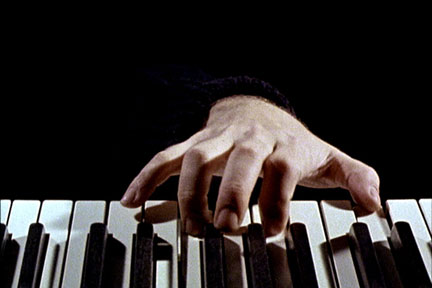
By Tim Smith
Sun Music Critic
July 20, 2007
"My greatest love is Bach," says Baltimore filmmaker Michael Lawrence. "He has driven my life. But there hasn't been a decent film made on Bach."
Lawrence plans to change that.
Filming is set to start next month on a project that will focus not on the biographical side of Johann Sebastian Bach but rather on the power and genius of his music and the artists who are drawn to it.
"Bach films are either stuffy, period-looking things, or they just involve going around Germany to places where he lived," Lawrence says. "I'm dealing with people who have a very strong personal connection to Bach. I'll be getting them to talk about Bach. The idea is to let the audience into the experience."
Lawrence expects to shoot in Baltimore and other locations. He approached an impressive and wide-ranging lineup of Bach-inspired musicians to be in the film, including pianists Leon Fleisher and Joao Carlos Martins; violinist Hilary Hahn; classical/bluegrass/jazz artists Bela Fleck and Edgar Meyer; jazz pianist Dave Brubeck; and composer/humorist Peter Schickele (creator of the immortal, imaginary P.D.Q. Bach).
"To my surprise, they're all interested in doing the thing," the filmmaker says. "I've joked that it's going to have to be 10 hours long." Lawrence envisions a two-disc DVD product when he's finished - the film, which will blend conversation and music, and an extra all-music disc. The stocky, bushy-bearded, Indiana-born Lawrence, 62, has been making music-related films for the past several years. Recent releases include Aaron Shearer: A Life with the Guitar, devoted to one of the most influential teachers of classical guitar (Lawrence studied guitar with Shearer at the Peabody Institute, from which he graduated in 1970).
Before picking up a camera, Lawrence composed scores for several films, among them Julian Krainin's Emmy-winning 1969 documentary The Other Americans. Lawrence once had a studio in downtown Baltimore but now works mostly out of a room in the Dundalk house where he and his wife live.
The Bach film will mark Lawrence's first experience with the high-definition format. "It's a little scary," he says. "I have to learn a whole new technology, a new camera, a new editing system."
The first filming session will be in August at Peabody with organist Felix Hell. "I have to tell you I always thought of organ music as a big pile of mush," Lawrence says, "but I realized it was so important to Bach's life, so we have to have it in the film."
Lawrence plans to intersperse footage of Hell's playing with shots of the insides of the instrument. "You'll never have seen the organ as you will in this movie," he says.
Musicologist and pianist Charles Rosen will be filmed playing Bach in his New York apartment. A variety of other locations will be used as the project progresses. "One thing I don't worry about is making a good film," Lawrence says. "With the quality of these musicians, it will be a good film. But I may well have to pay for it myself."
As Lawrence is the first to admit, that won't be easy.
"I never made much money as a filmmaker," he says. "I've got about $6,000 in the bank for this film ... $75,000 is all I need. I work cheap. It would be good for a corporation to have their name on the film. People love Bach all over the world."
tim [dot] smith [at] baltsun [dot] com
- May, 2007 Guitar Review Magazine, Winter 2007 Manuel Barrueco: A Gift and a Life
- Director Michael Lawrence has produced the first documentary about a classical guitarist that could be shown in an actual movie theater. I thought I knew all there was to know about Manuel Barrueco: that he was originally from Cuba and ushered in a new way of playing. This, as veteran director Michael Lawrence shows, is only the tip of the iceberg.
Lawrence's documentary starts out in Santiago de Cuba, where Barrueco was born and began playing guitar. Barrueco recounts how Castro's coming to power was an exhilarating experience that quickly changed. According to Barrueco, the most painful experience of his life was leaving his hometown on a train, leaving all of his relatives behind. Upon arriving in Miami, a place Manuel liked, his parents quickly realized that it would be beneficial for their son's musical development to move north. Settling in Newark, New Jersey Manuel had a hard time adjusting. Concerning his public high school experience, Barrueco notes that, "It seemed to me that lunch hour meant that the Italian kids and the black kids wanted to kill each other. There were a lot of gangs in the area...I hated living there." Despite these years, when support for his playing was limited, Barrueco did end up at Peabody. Once there, he did not practice at all: "I really didn't feel like playing. I became rebellious...all I did was basically party the whole time." Toward the end of his undergraduate career, however, Barrueco did start to practice seriously. Faculty members quickly recognized his talent, and before he knew it he was making his Carnegie Hall debut. Weighing in throughout the film are such luminaries as David Tanenbaum, David Russell, Andy Summers, Eliot Fisk, Al Di Meola and Placido Domingo, among others. It is the insights of the people who know him, most of whom have played or recorded with the maestro, that really shed light on Mr. Barrueco as an artist. Whether you are a Barrueco fan, or just enjoy a good story, there is something here for everyone. - Ian Gallagher, Guitar Review
- March, 2007 The National Journal of the Music Library Association, March '07 issue
- Manuel Barrueco is considered to be one of the finest classical guitarists performing today and the DVD of Manuel Barrueco: A Gift and a Life explains how that came to be. Michael Lawrence did a fine job of producing and directing this hour program. With dazzling footage of Barrueco performing and enlightening and fascinating interviews, world acclaimed musicians detail the current phase of Barrueco’s career. Camera angles allow excellent views of the guitarist's superb technique while the audio quality provides a fine opportunity to experience this artist’s marvelous tone production and tasteful nuance of expression. This offering by Michael Lawrence will be a valuable addition to any DVD collection.
- Randall Zwally, The National Journal of the Music Library Association
- December 2006 - American Public Television announces that Manuel Barrueco: A Gift and a Life will be broadcast in 2007 by WNET, NYC and other PBS stations around the country.
- September 24, 2006 — KQED San Francisco Broadcast of Manuel Barrueco: A Gift and a Life
- July 2006 - Michael Lawrence Films Productions Reviewed by Fanfare Classical Music Magazine
- July 2006 - New Michael Lawrence web site online
Welcome to the new MLFilms.com web site
Fanfare Classical Music Reviews Magazine has reviewed three of Michael Lawrence Films' productions. Below is the review by columnist Robert Schulslaper.
Fanfare Classical Music Magazine Reviews, Sept/Oct, 2006
Manuel Barrueco, a Gift and a Life
Aaron Shearer: A Life With The Guitar
The Mind of Music
As they like to say in Hollywood, Michael Lawrence's career arc has traced an intricate path, leading from teenage banjoist/folk singer, to writer, producer, director, and editor of more than 20 documentaries, one of which inspired the movie Quiz Show, with stops along the way as a classical guitar recitalist (performing live as well as on television and radio), a film composer of more than a dozen scores, and an author of many film and television treatments. He is a graduate of the first guitar class at the Peabody Conseratory, and therefore had close contact with two of his subjects, guitarist Manuel Barrueco and teacher Aaron Shearer. Both are renowned in the classical guitar world, and their life stories enliven these fine films.
Manuel Barrueco, a Gift and a Life, is an intimate introduction to the life and art of an outstanding virtuoso who has suffered from the political upheavals in his native Cuba, but who has triumphed over adversity to achieve his deserved success. Barrueco is revealed to be a shy, somewhat reserved and thoughtful man, who nonetheless has firm artistic convictions, and can express those ideals convincingly in performance. There are many excellent musical examples in the film, traversing a repertoire ranging from Bach to The Beatles, and including Lecuona, Scarlatti, Villa Lobos, Albeniz, Granados and Sierra, among others, as well as sincere tributes to Barrueco from his equally celebrated peers, Elliot Fisk, David Tanenbaum, David Russell, the Assad brothers, and Al Di Meola. Former EMI producer Simon Woods refers to “the art that conceals art†to describe Barrueco’s playing, and the other speakers essentially amplify this idea: Barrueco is a patrician, elegant exponent, technically superb, coloristically gifted, lyrical, self-effacing, but intensely musical and communicative. Barrueco's playing throughout is beautiful and inspiring, as are his thoughts about music: "For me, music is about feelings...it's about form, it's about traveling to different countries, to different times...but I think most of all, for me, it's just about what it's like to be human, what it feels like to be human. To me, that's what music is about."
In addition to Barrueco's performances, the playing of the Assad brothers, Al Di Meola and David Russell is a very enjoyable part of the film. In a charming vignette, five guitarists are shown relaxing and playing at Barrueco's home. After some exciting guitar wizardry by the Assad brothers, and bits by Barrueco and Russell, the latter demonstrates his unusual ability to play the guitar with his nose and tongue, and the five guitarists play together on one instrument.(Who says classical musicians are stuffy?) The visit concludes with Sergio Assad playing a beautiful duet with Barrueco, Farewell, that compliments the sad story of Barrueco's estrangement from Cuba that's interspersed with the music.
Aaron Shearer was Manuel Barrueco's teacher (Michael Lawrence was also one of his students), and in Shearer's opinion, Barrueco is the greatest guitarist performing today (quite a compliment). Shearer has taught many guitarists who later became famous, and in David Tanenbaum's words, "Ultimately, it may be who you produce after a lifetime of teaching that really defines what you've done. It may not be the method books you write, but the players that you create, and no one has created anywhere near the kind of players that Shearer has." (Tanenbaum is a prolific recording artist and Chairman of the Guitar Department at The San Francisco Conservatory of Music.) To Julian Gray, (a guitarist and member of Peabody's faculty), "Shearer changed the way that people thought about the guitar. It's a very big accomplishment to change the discourse of an instrument, the way that he did." Shearer apparently is a kind, but firm teacher, highly analytical, who even in retirement continues to probe the secrets of guitar technique. He's dedicated much of his life to the guitar, from childhood on, and his students obviously thrived under his tutelege. He too, like Barrueco, had to overcome hardships, first poverty, and then musical isolation and the lack of properly systematized instruction to achieve his goal. A devasting remark by his idol, Segovia, regarding Shearer's efforts to produce a comprehensive guitar method, would have crushed a less devoted seeker, but Shearer perservered, ultimately being vindicated by the great success of his instruction books. Aaron Shearer, A Life with the Guitar, like Manuel Barrueco, a Gift and a Life, presents many beautiful selections, some performed by Barrueco, and others by a collection of groups and soloists. I especially enjoyed Barrueco in Scarlatti (Sonatas in E, K.380 and B minor, K.27) and Nazareth (Odeon), and the Aurora Guitar Quartet's polished playing of Morena-Torroba's La Boda, Bizet's Gypsy dance from Carmen, and Brouwer's Cuban landscape with rain. La boda opens the program, and is enhanced by innovative camera work: I can't recall seeing a more sophisticated visual adjunct to a musical performance.
Both documentaries offer revealing biographical portraits, and should please anyone who is curious about the lives and personalities of prominent musicians and teachers. Of course, both films should be required viewing for students and aficionados of the classical guitar. I have one complaint, perhaps not a fair one, which is that the music can only be heard in the context of the film. In other words, any voice overs will be repeated with the music during subsequent auditions. I say unfair, because Michael Lawrence countered this observation by explaining that he set out to make documentaries, not concert fiilms, and I can't really criticize him for achieving his aim. I'm just expressing my wish to have had the performances available on a separate track.
The Mind of Music explores music's place in the universe and in the life of humanity. Musical luminaries Yehudi Menuhin, George Rochberg and Gunther Schuller air their views, and also discuss the compositional urge and process. Dr. Lewis Thomas and musicologist Eugene Helm add their thoughtful comments, and well played musical interludes speak witout words about music’s subtle power. A Bach prelude from one of his cello suites opens and closes the film, it's sonorous majesty bestowing intimations of higher realms. In between, music by Brahms, Stravinsky, Faure, Salzedo, Mozart, Byrd, Pachelbel, and Victoria plays to refresh the ears and soothe the soul. Although I agree that music is miraculous, mysterious and inherently human (ideas vividly expressed in the film), I don't think our enjoyment of music has to be overburdened with profound “meaning†to be valid, nor do I necessarily believe that we vibrate with the universe when we play or sing (although on some level, perhaps we do), but anyone who loves music should entertain such noble speculations, if only for the length of the film. I find The Mind of Music to be a very well constructed half hour, wise without being didactic or pompous, and a stimulant to thought.
Michael Lawrence has used his knowledge of music, and his skill as a film maker to give us three documentaries that will amply reward an interested viewer, and I look forward to whatever productions he may send my way.
